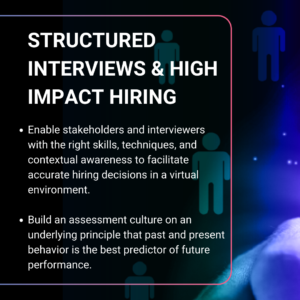In today’s competitive talent landscape, interviews have evolved into a crucial touchpoint of the candidate journey. Enhancing candidate satisfaction while accurately assessing skills is the key to successful recruitment. Read our latest blog to uncover how structured interviews not only improve hiring decisions but also create brand ambassadors for your organization. Download our 2023 Talent Playbook to explore more cutting-edge recruitment strategies.

Structured Interviews and High Impact Hiring
An Interview experience is one of the biggest drivers of a candidate’s overall satisfaction with the hiring process,, and 83% of candidates say that a negative interview experience can significantly impact their interest in a company.
Interviews are more complex now than ever, with jobs becoming more specific and multi-disciplinary skills to be assessed. But this stage has the potential to change everything, crafting an interview process that boosts candidate engagement while helping you identify the most qualified candidate for each role, is a recruitment win-win.
Organizations should implement structured interviews to assess candidates. This involves using the same interviewing methods and practices to assess all the candidates that apply to a particular job. Using pre-formulated questions and rubrics that are fair and better suited to predict job performance across a job family to gauge who will truly do the job well. Structured interviews are better at predicting candidate performance even for unstructured jobs. Google, for example, uses the same interview questions, assessment, and a universal grading scale to assess candidate responses and using predetermined qualifications for consistent hiring decisions across the job family.

Advantages of Structured Interviews:
- Offers a hiring model designed to attract and engage top talent
- Completely eliminates the element of ‘gut feel’ in hiring decisions
- Better hires eliminating all elements of personal preferences or biases
- Improves the bottom line by hiring right the first time.
- Helps with higher retention rates
- Avoids costly hiring mistakes
- Creates diverse teams – instead of hiring a candidate who looks, acts, or thinks like you, it will help to hire the best candidate for the job.

Key Takeaways
- Build a pool of trained interview panels to facilitate seamless scale with a focus on quality of talent – Build a business context-sensitive pool of interviewers.
- Build systems within the assessment process to facilitate objectivity in virtual hiring decisions.
- Enable stakeholders and interviewers with the right kind of skills, techniques, and contextual awareness to facilitate accurate hiring decisions in a virtual hiring environment.
- Build assessment culture on an underlying principle that past and present behavior is the best predictor of future performance
Interviews are critical to recruitment and crafting a structured interview process. Keeping candidate experience at the core will deliver either a successful hire, a valuable member of your talent community, or a brand ambassador for future hires.
Structured interviews empower you to make data-driven hiring decisions, ensuring you bring the right talent on board. Don’t miss out on this essential tool for modern recruitment. Download our 2023 Talent Playbook to unlock even more insights and strategies to fuel your recruitment success.
